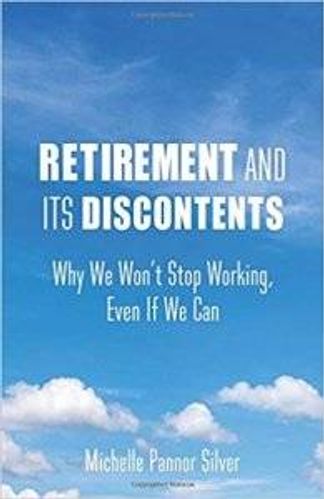When Retirement Is a Bad Fit
What this author learned talking to retired MDs, professors, CEOs and homemakers
The idyllic retirement: free time to enjoy doing things you like and spending time with friends and family. The reality of retirement for some people, according to Michelle Pannor Silver, author of the new book, Retirement and Its Discontents: unfulfilling, rudderless and filled with a loss of identity.

I just read Silver’s fascinating, if a little depressing, book and interviewed her about it, looking for her wisdom on how people can avoid discontentment in retirement (highlights from our conversation are below).
While most authors writing about retirement and retirement planning focus on the financial side, Silver — an assistant professor in the department of sociology and the interdisciplinary center for health and society at the University of Toronto — looked at the sociological side. She interviewed dozens of former doctors, professors, CEOs and homemakers who viewed themselves as retired, all of whom found the transition to retirement challenging at best.
Many felt forced into retirement by their employers or strongly pushed into it by friends, colleagues and families. Some miss doing the work they had done. Most just felt unprepared for their new life, which echoed a statistic I saw in the new Charles Schwab 2018 Boomer Study. Schwab asked 278 participants in 401(k)s age 54 to 70 what they planned to do when they retired from their primary job or occupation and 17 percent said: “Not sure what will happen.”
Here’s what Silver told me about “retirement and its discontents:”
Next Avenue: What made you want to do this project and write this book?

Michelle Pannor Silver: The inspiration came from my father, who was a psychotherapist. When I was in my early 20s, he developed dementia and there eventually came a point where it didn’t make sense for him to keep running his practice. I closed it up and shredded his files and eventually retired him; he was in his late seventies. His work had been very important to him. That inspired me to think about what it means to end a career you really care about and one that is so intertwined with who you are. That inspired my experience studying people’s transitions to retirement and to ask people what retirement means to them.
You asked what their retirement parties were like. Why? And what did you learn from that?
When I started talking with people about what marked their retirement turning point, they often pointed to the party leading up to it. One man, an academic physician, described it as being more like a funeral; he felt like he was sitting there and people were talking about him as if he had died and it was the end of his life.
He realized he had a lot of things he was still working on, if not his best work still to come. And he decided to focus on doing the research he sought to be his life’s work. The party sealed the deal.
He would tell me: 'I’m retired and have a set of historical fiction novels I’ve always meant to read and I’m interested in.' He’d try to pick up one of the books that was supposed to be for fun and just couldn’t do it. He’d immediately gravitate to the medical journals that were work-related.
What surprised you about what you heard when you talked to the discontented retirees?
One of most obvious surprises was with the homemakers. It was surprising off the bat that they identified themselves as retired at all. Yet that’s how they saw themselves.
I was also surprised by the CEOs who were discontented in retirement and couldn’t wait to find some paid work that was fulfilling. For them, volunteering wasn’t going to cut it. And nonfulfilling work wasn’t going to cut it.
And I was surprised by the connections between the groups of people. Some of the women who had been homemakers described the loss they experienced when they no longer had to do the thing that was their calling in life as something remarkably similar to what the physicians said. The physicians described a sort of lack of adrenaline rush that they used to receive coming into work.

For the doctors and the CEOs, was the retirement transition hard because they were Type A personalities?
I think they were all driven by their work, but I’m not sure I would say they were all Type A. I’d say they had been acculturated through their work to take work really seriously; if you’re not willing to do the work, you’re out. They spent their adulthood being shaped and cultivated by work. Societal norms and pressures said they needed to maintain this lifestyle and attitude. So it was more sociological than psychological.
It’s a common American ideal to identify strongly with what you do. I worked in Washington, D.C., and you’d go to a cocktail party and the operative question — before ‘What’s your name?’ — was 'What do you do?’ Then maybe after that, they’d want to know your name.
Did you see common themes by gender?
I found women said things that were remarkably similar to what the men said. But they described more about what they had to give up for their careers.
Did you see common themes based on whether people were married or in unhappy marriages versus people who were single or divorced or widowed?
Yes, that was so interesting. One man said when he was approaching retirement he was shown a video on how the workplace will prepare you for retirement, and it was a couple and he was a single man. He said if you stop to think about the media ads and workplace videos about retirement, they’re all couples sitting side by side in bathtubs on a cliff or running along a beach. It’s rare to see a single person. For him, retirement was a double loss: losing his career and getting reminded he didn’t have someone to be with.
Some of the married retired homemakers said it was dissatisfying having their husbands home all day. The women used to be managing the homefront and suddenly their husbands were interested in tinkering around the house or expecting lunch.
I didn’t find that married people seemed to enjoy retirement any more than single people, but there was a societal expectation that they should.
You say defining retirement as an ‘age-specified exit’ is anachronistic. Why?
For many people, when you think about retirement, it’s associated with a specified age — sixty five was the magic number in the U.S. for a long time because it was tied to Social Security benefits. Several of the people I interviewed said, ‘My father retired at sixty five, so that’s why I did it.’
But the idea of doing it at an arbitrary, chronological age doesn’t behoove anyone. There are a wide range of physical and cognitive abilities that people have that are not tied to age. Arbitrary rules that tie age to retirement can be tricky on both ends of the spectrum — people who need to retire early and people who still have a lot to give.
You say society provides no moral guidance when it comes to retirement. What do you mean and how can that be changed?
Retirement is this widespread social phenomenon, but at the same time it’s a deeply personal transition. There are two components to it: one is the workplace side and the other is the personal side.
On the workplace side, what we can do is help employers connect with employees in ways that do not write them off. Instead, give them some attention. Say: ‘You’ve got all this institutional knowledge, this is what you’re good at and what your interests are. Tell me what you want to do here and then pivot, so you can focus your energies in a different way.’
Employers spend so much time and energy with people at the early parts of their career and people get ignored at the end. It’s so ironic, since by the end you have developed all this experience and skills. Then to be cast aside or to assume you will leave is a big mistake.
On the personal side, how do we help people get the most out of life? Right now, when you look at societal ideas of retirement, it’s either lying on the beach or playing the most boring game of bingo just waiting to die.
We live in remarkable, unprecedented times where the life expectancy is longer than ever. So my advice for the personal side is: Don’t pay too much attention to the retirement ads; have a financial plan, but also a non-financial plan.
Don’t say ‘I’ll be at my job and do a hundred and 10 percent and then at retirement zero, stopping cold turkey. Instead, find alternative ways to make the transition.
Are the problems people have dealing with retirement about the loss of status? Or lack of daily structure? Or something else?
I would say Number One was loss of personal identity; Doctor X had always been a doctor and suddenly went to being a retired doctor. I suppose that is status. But a loss of daily structure was really important, particularly for CEOs. Several of them had had two or three administrative assistants, so every hour of the day was planned out for them. They didn’t know how to use personal planning devices in retirement. It was embarrassing and they kept missing appointments.
What should people do differently, or better, so they’re less likely to be unhappy in retirement?
Start making a list of things you enjoy in life; not just things you enjoy currently. Maybe things you enjoyed as a child and always wanted to do, like wanting to play piano or be a good cook. It doesn’t have to be something you’re good at; just something that interests you. Then channel the energy you used at work.
And, as much as possible, try to include doing things that are about movement.


